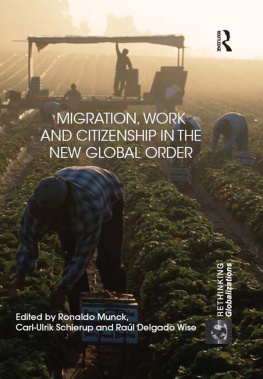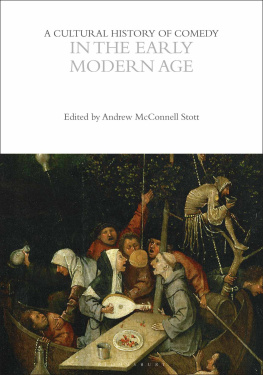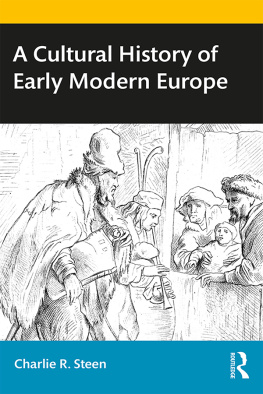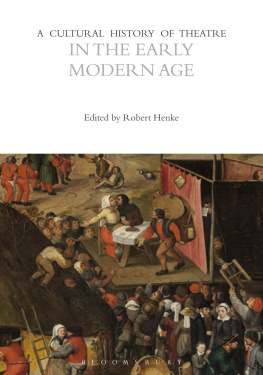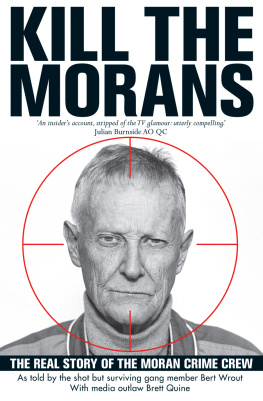A CULTURAL HISTORY
OF WORK
Volume 3
A Cultural History of Work
General Editors: Deborah Simonton and Anne Montenach
Volume 1
A Cultural History of Work in Antiquity
Edited by Ephraim Lytle
Volume 2
A Cultural History of Work in the Medieval Age
Edited by Valerie L. Garver
Volume 3
A Cultural History of Work in the Early Modern Age
Edited by Bert De Munck and Thomas Max Safley
Volume 4
A Cultural History of Work in the Age of Enlightenment
Edited by Deborah Simonton and Anne Montenach
Volume 5
A Cultural History of Work in the Age of Empire
Edited by Victoria E. Thompson
Volume 6
A Cultural History of Work in the Modern Age
Edited by Daniel J. Walkowitz
Issues around work and the workplace seem to be having a renaissance and are no longer embedded solely in the discourses around Marxism and labour movements. Similarly, new and fresh research has been taking place around guilds, skill, control and gender issues. A Cultural History of Work takes an approach that focuses on culture in order to explore the subtleties of the character and dynamics of work and the people and relationships involved in working and the workplace in a theoretically holistic way to bring together disparate historical traditions and historiographical approaches. The aim and scope of A Cultural History of Work is to offer a comprehensive survey of the social and cultural construction of work across six historical periods. This approach that focuses on the cultural history of work provides an opportunity to explore the dynamics of work and the people and relationships involved in working and the workplace, helping to rethink boundaries and the issues of work. This is not an economic history of work, but a cultural one. Of course, we talk about economics, but the fundamental concept is to explain the ways in which work was situated in and influenced cultural dynamics of the western world. It is a key contribution to the process of rethinking boundaries and issues of work.
A Cultural History of Work draws on the western world. Contributors approached their chapters with a great deal of freedom, drawing on their specific expertise in national and regional histories, but throughout the thirty-six chapters that make up the series, they have tried to embrace the West. The series does not intend to cover all of western culture, or even all of Europe and North America. Authors instead have aimed at representing the broad trends and nuances of the culture of work from antiquity to the present. Thus A Cultural History of Work concentrates on the central themes in western work, with some sensitivity to areas we know less about.
This is a work of scholarly reference designed to provide scholars and students with a detailed, nuanced overview. Each contribution has been written as an original chapter presenting an overview of a theme in a period, but each also includes a wide range of case material and has a particular thrust or point of view (or points of view) informing the organization of the piece. The series is structured into six time periodsthough historians will always quibble about what these periods mean and will blur the edges. That is part of the process of understanding the past. And time does not have the same meaning across regions, much less countries or continents. Each volume covers a long period of time and a broad geography that can and will introduce a range of variables. Each volume uses the same chapter titles so that readers can read on a theme across volumes, or read through a period exploring the range of themes and nuances that each volume presents. There are also overlaps within volumes and across them that enrich the discussion.
The editorial decision to study work rather than labour is suggestive of a broader, more encompassing field of study that lends itself more readily to different periods. For example, in particular it is more appropriate to use work for periods such as the Antiquity and the Middle Ages because labour looks in one sense as an eighteenth/nineteenth-century concept. English is rather unusual in having two words whose meanings overlap considerably, but are not identical. For example, there is only one word in French, travail, like Arbeit in German, arbejde in Danish/Swedish/Norwegian, lavoro in Italian. Some other languages tend to have one primary word also, for example, trabajo in Spanish, though there are other usable words. From a definitional point of view we can argue that labour means the use of mental or physical capacities/faculties, so it implies suffering and difficulty, whereas work has to do with the simple act or fact of doing something/the activity/the action in progress. From the point of view of the political economy, labour seems to refer to the Marxist discourse; work is more pragmatic and less laden with cultural overtones. So, work describes the parameters of this project while labour is one aspect of it, which is more important in the nineteenth and twentieth centuries, and to a lesser extent in the eighteenth. Thus we argue work seems more neutral and general and therefore more applicable across six centuries.
Moving from the world of antiquity and into the twenty-first century, the culture of work has shifted considerably as technologies, organisation and locations have changed. Workplace relations have also undergone transformations from small scale and familial settings to large-scale and potentially less personal environments. And yet, the world of work remains complex with great variations between national cultures, political and economic approaches to managing the fields of work, and especially in the ways that people have negotiated their own spaces and places within them. Work retains many meanings from the simple need to survive to senses of deep satisfaction for the character of the job and the creativity one can achieve. It may be valued for the income or wealth it can generate; conversely, some choose to work less and on their own terms. Part-time, job-sharing, self-employment and the IT revolution have offered different routes for some people. Workers can, however, remain tied to an employer and though nominally slavery does not exist in the West, there are those, like sweated immigrant workshops, and live-in domestic workers, who may feel that little has changed. The Cultural History of Work traces and explores many of these routes and their implications for people and their cultural experience of work.




